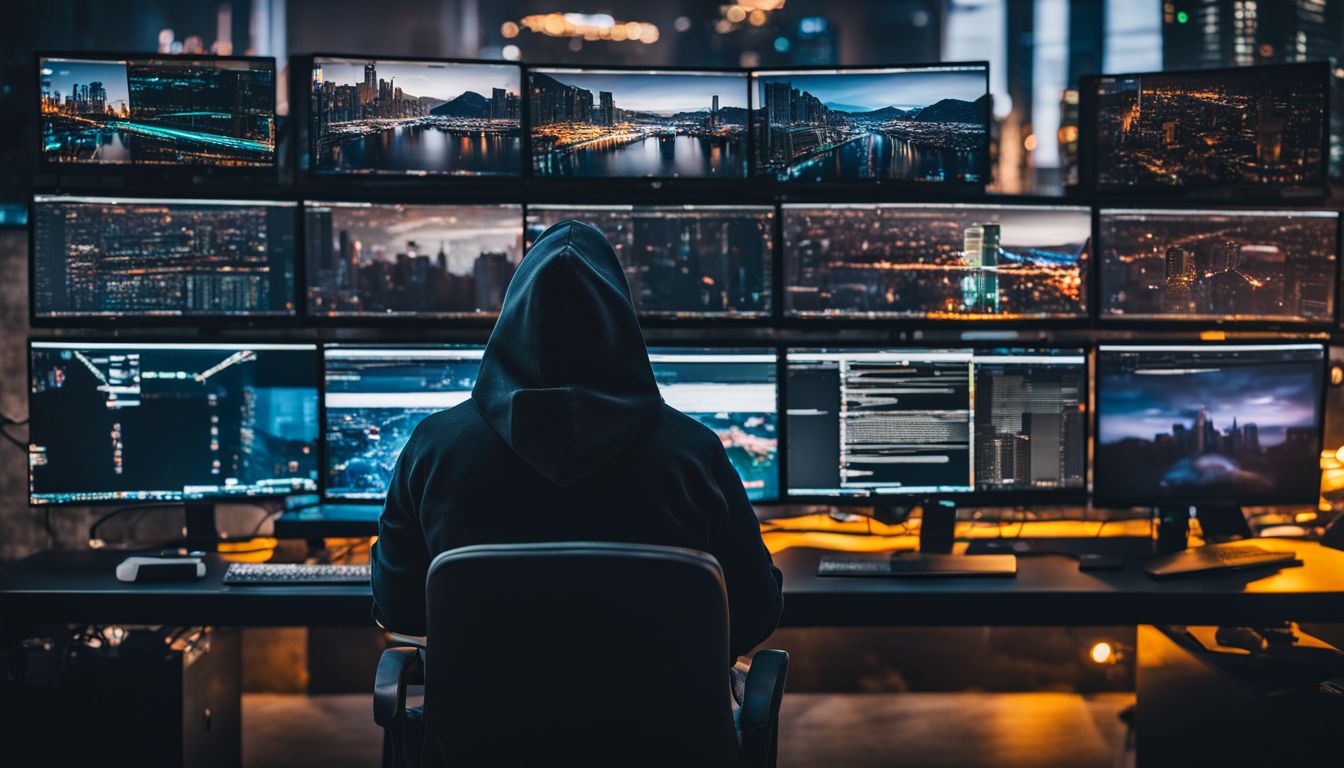Keeping your online world safe feels like a never-ending battle, doesn’t it? Here’s a fact: businesses are now using AI to boost their cybersecurity defenses. This post will show you how AI can help fight off hackers and keep your data safe.
Ready to dive in?
Key Takeaways
- AI makes cybersecurity faster and smarter by spotting dangers quickly. It uses machine learning to learn from past attacks, helping to catch threats before they do harm.
- There are risks with AI in cybersecurity, like the chance of making biased decisions based on flawed data or programming. Also, bad people might trick it or use it for harmful acts.
- To put AI into cyber defense well, you need to know your security needs, pick fitting tools, train your team on AI, keep updating the systems, and always follow privacy laws.
Understanding the Role of AI in Cybersecurity

AI changes how we protect against cyber threats. It speeds up the identification of dangers and makes response teams more effective, using tools like machine learning to sniff out problems fast.
Faster Threat Detection and Response
AI in cybersecurity means bad stuff gets caught way quicker than before. AI tools look through tons of data fast, finding threats that could harm computers and networks. These tools use machine learning to get better at spotting danger over time.
Think of it like having a super smart guard dog that learns every day how to catch sneaky burglars faster.
AI doesn’t sleep, making cybersecurity teams’ jobs easier by catching dangers quickly.
With AI speeding things up, security pros can focus more on fixing issues instead of just looking for them. This quick action helps keep information safe and cuts down on damage caused by cyber attacks like malware or phishing scams via Facebook login.
It’s all about giving the good guys the upper hand against cybercriminals.
Improved Accuracy and Efficiency
AI brings a new level of accuracy and speed to cyber security. It can spot patterns that humans might miss. This means it catches bad activities faster and more accurately. AI doesn’t get tired or overlook details like people can, making it super reliable at finding threats.
Besides being sharp at detection, AI also makes things run smoother and quicker by doing jobs automatically. It checks devices for weak spots way faster than a person could, thanks to algorithms designed to search quickly and thoroughly.
IBM Security uses this smart tech to help their teams work better and make fewer mistakes, proving how powerful AI is in keeping our digital world safe from attacks.
The Risks of Relying on AI in Cyber Security

Using AI in cyber security sounds great, but it’s not perfect. Sometimes, these smart systems can make mistakes based on wrong data or flawed programming. This could lead to unfair decisions.
Also, bad people might find ways to trick AI, making it a tool for harm instead of protection.
Bias and Discrimination in Decision-Making
AI systems learn from data. If this data has biased information, the AI might make unfair decisions. This can harm certain groups or people more than others. Imagine a security program that uses past records to find threats.
If those records unfairly target a specific group, the AI could continue this unfair treatment.
75% of places with computers and work think about stopping the use of ChatGPT and similar tools in jobs. They worry these AI tools might not treat all users fairly. Security experts stress making sure AI decisions don’t hurt some while helping others.
They also highlight training these systems with diverse data to reduce bias, ensuring every user is treated equally by cybersecurity defenses.
Potential for Misuse or Abuse
AI technology faces risks of misuse or abuse. Malicious actors can exploit AI algorithms to access private data or harm systems. If these bad guys get their hands on AI, they could use it to attack important web structures or steal sensitive info.
This fear is real for companies who worry that their stored data might end up in the wrong hands.
The design of AI tech also brings problems with bias and unfair decisions. Sometimes, the way an AI learns can lead it to make choices that are not fair, affecting certain groups badly.
This issue matters a lot because it can hurt people’s trust in how organizations handle security tasks using artificial brains. Keeping cybersecurity strong means making sure AI acts fairly and stays out of the reach of those wanting to use it for harm.
Implementing AI Solutions in Cybersecurity
Putting AI solutions into action for cybersecurity can give your defense against cyber attacks a big boost. It helps spot threats faster and makes your security team’s job easier. Here’s how you get started:
- Identify Your Needs – Figure out where your security could use help. This might be in spotting malware or finding weak spots in your network.
- Pick the Right Tools – Choose AI software that fits what you’re looking for. Managed detection and response services are great for catching threats early.
- Train Your Team – Make sure your security professionals know how to work with AI. Some programs can help them get up to speed.
- Use Data Wisely – AI needs data to learn and get better at its job. Securely collect and use data about past cyber attacks to teach your AI systems.
- Automate Regular Checks – Set up your AI to regularly scan for vulnerabilities without human help. This saves time and catches problems fast.
- Keep an Eye on the AI – Even though AI is smart, it still makes mistakes like missing false alarms or overreacting to normal activities. Check its work often.
- Update Often – Cyber threats change all the time, so keep your AI tools sharp with regular updates and training on new threat patterns.
- Plan for Risks – Understand that using AI comes with risks, such as biased decisions or being used in wrong ways by bad people.
- Work Together – Make sure humans and machines work hand-in-hand, combining tech smarts with human insight for the best defense.
- Follow Laws – Always make sure you’re following laws about data privacy when using AI in cybersecurity.
By taking these steps, you put yourself on a strong path towards safer cyberspace with the help of artificial intelligence tools.
Conclusion
AI in cyber safekeeping is like a smart guard that learns and gets better over time. It spots dangers fast, cuts down mistakes, and doesn’t get tired or need breaks. Sure, it’s not perfect – sometimes it can make wrong choices or be used in bad ways.
But the benefits? They’re huge. Companies save money, secure our data better, and stay one step ahead of hackers. By training AI on heaps of info and using smart machines, we beef up our internet walls.
Leveraging AI for cyber protection isn’t just good; it’s needed to fight off future cyber crimes efficiently and effectively. So yes, using artificial smarts for keeping our online world safe? A big thumbs up from here!
FAQs
1. What does AI do for cybersecurity?
AI in cybersecurity works by using machine learning and artificial intelligence to spot cyber threats, analyze risks, and protect sensitive information from hackers. It’s like having a super-smart guard that learns and gets better at keeping data safe.
2. How can AI improve an organization’s security?
By applying AI, organizations can automate their security operations–making it faster to detect cyber crimes and reduce false positives. This means security teams can focus on real threats, improving the overall security posture with less manual effort.
3. Can AI replace human intelligence in cybersecurity?
Nope, even though AI is powerful for handling big volumes of data and spotting patterns, human intelligence is still crucial. People bring understanding and intuition to tackle complex security challenges that AI might miss.
4. Why are cybersecurity professionals important when using AI?
Cybersecurity pros ensure that the deployment of AI-powered security tools aligns with an organization’s specific needs. They manage these tools, interpret alerts accurately, and make informed decisions to strengthen defense mechanisms against cyber attacks.
5. How does leveraging AI help with managing large amounts of data?
AI allows for analyzing massive amounts of data quickly–identifying potential threats or vulnerabilities fast! This helps secure vast networks without missing out on key details that could indicate a breach or attack attempt.
6. Is all use of AI in cybersecurity beneficial?
Mostly yes… but it’s vital to deploy secure Ai techniques carefully! Without proper management, there could be gaps in how effectively these systems work or how they’re integrated into wider security infrastructure—meaning not every tool fits every situation perfectly.

